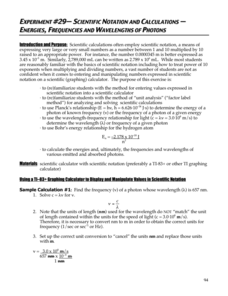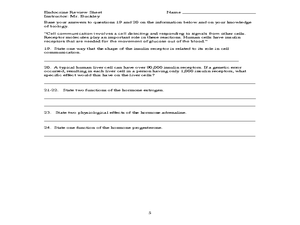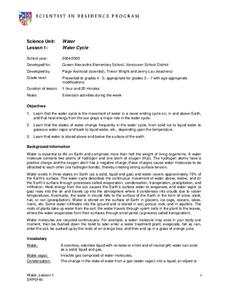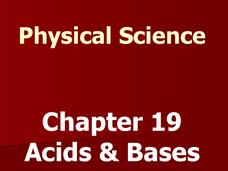Cornell University
Study Soil
What's in soil? Young scientists study the pH levels of soil from their school yard. They observe the land and area the soil came from to decide if location has anything to do with acidity level.
Curated OER
Scientific Notation
Review conversion of decimal numbers into SN form with these examples of common astronomical applications and quantities. Young learners rewrite those numbers with scientific notation and with the correct units. The answers are available...
Curated OER
Spectral Lines
Slides and slides of emission spectra bring this topic to light for your physics class! Exited electrons returning to lower energy levels is offered as the cause of emission spectra. In summary, viewers learn that we can determine the...
Curated OER
Cellular Respiration
Students are often confused by the huge amount of information and detail that can be learned about respiration. This is a great presentation summarizing the main 4 stages of cellular respiration. It is clear and uses diagrams and...
National Institute of Open Schooling
Hydrocarbons
The vast majority of hydrocarbons humans use help fuel cars, homes, and provide energy. A comprehensive lesson teaches pupils all about hydrocarbons. From alkanes, alkenes, and alkynes to benzene, classes study the preparation of these...
NASA
Christa's Lost Lesson: Effervescence
How are chemical reactions affected by gravity? Learners explore the phenomenon of effervescence as part of the Christa's Lost Lessons series. They compare findings in an experiment on effervescence to a video of a similar experiment in...
Pingry School
Scientific Notation and Calculations – Energies, Frequencies, and Wavelengths of Photons
The calculator has an interesting way of displaying numbers in scientific notation, but don't let that confuse your pupils! A lesson designed to give learners practice with scientific notation and calculators provides several practice...
Curated OER
Endocrine Review Sheet
Starting with a diagram of the kidneys and urinary tract of the human, this sheet has questions about excretion, blood concentrations of hormones, gland feedback mechanisms and the effects of some hormones.
Curated OER
Organic Compounds
Your young biologists will find these slides very useful to help differentiate between the different nutritional components. The slides contain step by step details of the different levels of structure and function. These would be...
Curriculum Corner
7th Grade Math "I Can" Statement Posters
Translate the Common Core math standards into a series of achievable "I can" statements with this collection of classroom displays. Offering posters for each standard, this resource is a great way to support your seventh graders as...
Curated OER
Nuclear Magnetic Resonance
Eleven slides are used in this PowerPoint to present how nuclear magnetic resonance works and to give learners an opportunity to interpret examples of nuclear magnetic resonance spectra. Ample information is provided, so this is a...
Curated OER
A Little Chemistry
The molecular properties of water are the focus of this chemistry-based assignment. Multiple-choice, true-or-false, matching, and fill-in-the-chart style questions query assignees about the forces that hold the water molecule together,...
Curated OER
Water Cycle
Young scientists explore Earth elements by conducting an experiment. They define water vocabulary terms such as condensation and precipitation. In addition, they conduct a water experiment in which they build a terrarium, so they can...
Curated OER
Fusion Confusion
High schoolers are introduced to three types of energy transfer: conduction, convection, and radiation. They model the scientific process of fusion to become with the sun and how it produces energy.
Mr. E. Science
Acids, Bases and Solutions
If you are not part of the solution, then you are part of the precipitate. The presentation covers solutions, suspensions, solubility, dissociation, and acid/base reactions. This is the 19th lesson in a series of 26.
Curated OER
Molecule Models: Model to Formula and Model to Formula
In this science molecule models learning exercise, student convert 8 molecule models to chemical formulas and 8 chemical formulas to molecule models.
Curated OER
Chemical Elements
For this informational text comprehension worksheet, student read the passage about Chemical Elements and complete 11 multiple choice questions about the passage.
Curated OER
Chemical Bonding and Shapes of Molecules
In this chemical bonds worksheet, students review the different types of bonds, Lewis dot structures, ions, and molecule shapes. This worksheet has 10 matching, 17 multiple choice, and 3 drawing questions.
Curated OER
Making Molecules
In this making molecules worksheet, young scholars complete a table of elements with their symbol, atomic number, atomic mass, number of protons, number of electrons, period and group. Students then make models using pipe cleaners and...
Curated OER
Combustion Analysis Worksheet
In this combustion worksheet, students are given directions as to how to analyze a combustion reaction and they then solve five problems using this process.
Curated OER
Integrating Space Science-Our Changing Universe
For this universe worksheet, students read about the big bang theory and the evolution of the stars from the elements. Students answer four critical thinking questions about the beginnings of our universe.
Curated OER
Exponential Problems
In this algebra worksheet, students solve exponential problems by rewriting it in standard form. They rewrite number using scientific notations and solve word problems. There are 10 problems with and answer key.
Curated OER
Surface Water and Groundwater
Students examine distribution of water and minerals. In this surface and groundwater instructional activity, students conduct an experiment with fresh and salt water making hypothesis and drawing conclusions about minerals.
Curated OER
Making Molecular Models
In these creative hands-on activities, students construct several different molecular models that represent substances that play an essential role in our nutritional needs. Using gum drops and toothpicks, students design the models....

























